This is a preprint.
ERβ mediates sex-specific protection in the App-NL-G-F mouse model of Alzheimer's disease
- PMID: 39091856
- PMCID: PMC11291054
- DOI: 10.1101/2024.07.22.604543
ERβ mediates sex-specific protection in the App-NL-G-F mouse model of Alzheimer's disease
Update in
-
ERβ mediates sex-specific protection in the App-NL-G-F mouse model of Alzheimer's disease.Biol Sex Differ. 2025 Apr 29;16(1):29. doi: 10.1186/s13293-025-00711-w. Biol Sex Differ. 2025. PMID: 40302001 Free PMC article.
Abstract
Menopausal loss of neuroprotective estrogen is thought to contribute to the sex differences in Alzheimer's disease (AD). Activation of estrogen receptor beta (ERβ) can be clinically relevant since it avoids the negative systemic effects of ERα activation. However, very few studies have explored ERβ-mediated neuroprotection in AD, and no information on its contribution to the sex differences in AD exists. In the present study we specifically explored the role of ERβ in mediating sex-specific protection against AD pathology in the clinically relevant App NL-G-F knock-in mouse model of amyloidosis, and if surgical menopause (ovariectomy) modulates pathology in this model. We treated male and female App NL-G-F mice with the selective ERβ agonist LY500307 and subset of the females was ovariectomized prior to treatment. Memory performance was assessed and a battery of biochemical assays were used to evaluate amyloid pathology and neuroinflammation. Primary microglial cultures from male and female wild-type and ERβ-knockout mice were used to assess ERβ's effect on microglial activation and phagocytosis. We find that ERβ activation protects against amyloid pathology and cognitive decline in male and female App NL-G-F mice. Ovariectomy increased soluble amyloid beta (Aβ) in cortex and insoluble Aβ in hippocampus, but had otherwise limited effects on pathology. We further identify that ERβ does not alter APP processing, but rather exerts its protection through amyloid scavenging that at least in part is mediated via microglia in a sex-specific manner. Combined, we provide new understanding to the sex differences in AD by demonstrating that ERβ protects against AD pathology differently in males and females, warranting reassessment of ERβ in combating AD.
Keywords: APP knock-in; Alzheimer’s disease; Amyloidosis; Estrogen receptor beta; Microglia; sex differences; sex hormone.
Conflict of interest statement
COMPETING INTERESTS The authors declare no competing interest.
Figures
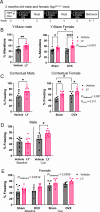

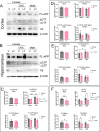
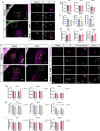
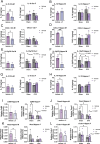
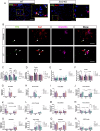
References
Publication types
Grants and funding
LinkOut - more resources
Full Text Sources
